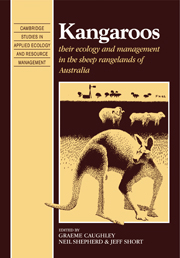Book contents
- Frontmatter
- Contents
- Preface
- Dedication
- THE STUDY AREA IN CONTEXT
- 1 Introduction to the sheep rangelands
- 2 The environment of the Australian sheep rangelands
- 3 The effect of weather on soil moisture and plant growth in the arid zone
- 4 Plant dynamics
- 5 The diet of herbivores in the sheep rangelands
- 6 Factors affecting food intake of rangelands herbivores
- 7 The mobility and habitat utilisation of kangaroos
- 8 Kangaroo dynamics
- 9 Condition and recruitment of kangaroos
- 10 Ecological relationships
- 11 Options for management of kangaroos
- Appendices to Chapter 8
- REFERENCES
- Author index
- Subject index
6 - Factors affecting food intake of rangelands herbivores
Published online by Cambridge University Press: 05 November 2011
- Frontmatter
- Contents
- Preface
- Dedication
- THE STUDY AREA IN CONTEXT
- 1 Introduction to the sheep rangelands
- 2 The environment of the Australian sheep rangelands
- 3 The effect of weather on soil moisture and plant growth in the arid zone
- 4 Plant dynamics
- 5 The diet of herbivores in the sheep rangelands
- 6 Factors affecting food intake of rangelands herbivores
- 7 The mobility and habitat utilisation of kangaroos
- 8 Kangaroo dynamics
- 9 Condition and recruitment of kangaroos
- 10 Ecological relationships
- 11 Options for management of kangaroos
- Appendices to Chapter 8
- REFERENCES
- Author index
- Subject index
Summary
Introduction
The amount of food eaten by a population of large mammalian herbivores affects their survival, reproductive success and, in the case of domestic stock, their economic performance. But intake by the herbivores also represents offtake from the pasture. Herbivores, by harvesting plant material from the pasture, have a feedback effect on biomass, growth and species composition of the pasture. Hence the herbivore and its rangelands pasture form an interactive relationship.
This chapter summarises the available information linking food intake of the major mammalian herbivores of the Australian sheep rangelands with food availability and identifies the factors, other than food availability, that modify intake. It then discusses the major feedback effects of this offtake on the vegetation.
The relationship between the food intake of a herbivore and vegetation biomass is known as the functional response. It can take a number of theoretical forms (Noy-Meir, 1975) but is most commonly expressed as an asymptoting function, often as a monotonically increasing curve (e.g. Allden & Whittaker, 1970; Arnold, 1975). At low biomasses the food intake of the herbivore is depressed because of the difficulties in locating and harvesting food. At high biomasses the intake of the herbivore is satiated and hence intake is relatively constant over a wide range of biomasses.
- Type
- Chapter
- Information
- KangaroosTheir Ecology and Management in the Sheep Rangelands of Australia, pp. 84 - 99Publisher: Cambridge University PressPrint publication year: 1987
- 10
- Cited by



